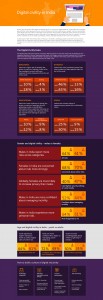 With growing internet penetration, there is an increased focus on taking steps to minimize threats that users face online. On the occasion of Safer Internet Day (SID), Microsoft released the findings of a survey conducted across 14 countries through its Digital Civility Index (DCI). Findings of the survey indicated:
With growing internet penetration, there is an increased focus on taking steps to minimize threats that users face online. On the occasion of Safer Internet Day (SID), Microsoft released the findings of a survey conducted across 14 countries through its Digital Civility Index (DCI). Findings of the survey indicated:
· 63% of Indian respondents reported having been exposed to an online risk. 44% of Indians experienced their most recent online risk within the past month, indicating higher frequency
· 69% Indian respondents expressed concern over an online risk
· Youth were more confident than adults in managing uncivil behavior, and were more knowledgeable about where to get help if needed. However, only 50% youth and 35% adults knew where to get help.
· Males in India reported more risks across categories – 64% compared to 61% for females. Whereas more females tightened privacy controls (61%) compared to males (50%) after experiencing online risk.
The Digital Civility Index is part of Microsoft’s continuing commitment to fostering safe, inclusive interactions online, and to raise awareness on the need for digital civility. “On Safer Internet Day, Microsoft is using the Digital Civility Index to amplify awareness and demonstrate the need to further educate young adults, parents, educators, and policymakers about the real-world consequences of negative online interactions, which can have serious consequences. We hope these findings will serve as an evidentiary base for a global drive toward digital civility and increase accountability among internet users,” said Madhu Khatri, Associate General Counsel, Microsoft India.
The findings were the result of a survey that examined people’s attitudes and perceptions about online behaviors and interactions. The survey polled teens (ages 13-17) and adults (18-74) asking about their experiences and encounters with 17 different online risks across four categories: behavioral, reputational, sexual, and personal/intrusive.
· On intrusive behaviour like hate speech, discrimination, unwanted contact, or terrorism recruiting, 79% Indians reported concern levels.
· 77% Indians reported behavioural concerns like cyberbullying, trolling, or online harassment.
· Concerns on unwanted sexual solicitation, sexting, revenge porn, or sextortion was reported by 77% Indians.
· Concerns on unwanted reputational behaviour such as doxing and damage to personal or workplace reputation was reported by 77% Indians.
Microsoft has a long-standing commitment to online safety. It has been an active supporter of Safer Internet Day each year, since it started in 2004. It collaborates with advocates, industry partners and governments worldwide to develop solutions and promote effective public policies that help protect people online.


